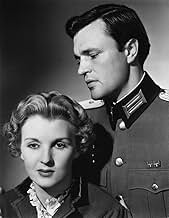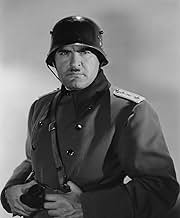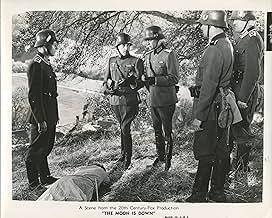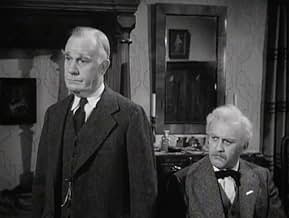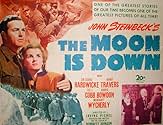During the Nazi occupation of Norway, a small Norwegian village struggles to cope with the invaders and some locals choose collaboration while others prefer armed resistance.During the Nazi occupation of Norway, a small Norwegian village struggles to cope with the invaders and some locals choose collaboration while others prefer armed resistance.During the Nazi occupation of Norway, a small Norwegian village struggles to cope with the invaders and some locals choose collaboration while others prefer armed resistance.
- Director
- Writers
- Stars
- Awards
- 6 wins total
Cedric Hardwicke
- Col. Lanser
- (as Sir Cedric Hardwicke)
Frederic Brunn
- German Soldier
- (as Frederick Brunn)
Ernst Deutsch
- Maj. Hunter
- (as Ernest Dorian)
Ludwig Donath
- Hitler's Voice
- (as Louis Donath)
Richard Abbott
- Villager
- (uncredited)
Louis V. Arco
- Schumann
- (uncredited)
Georgia Backus
- Villager
- (uncredited)
John Banner
- Lt. Prackle
- (uncredited)
Trevor Bardette
- Knute Pierson - Foreman
- (uncredited)
- Director
- Writers
- All cast & crew
- Production, box office & more at IMDbPro
7.0636
1
2
3
4
5
6
7
8
9
10
Featured reviews
A moving depiction of brave men - and women - under German occupation
This movie has no big-box office stars, nor a major director. Yet it tells its story effectively and, sometimes, in a deeply moving fashion, because the script is good and the actors, accustomed to playing character roles, make real individuals out of their assignments.
The movie starts off by establishing several points: 1) Norway fell fast to the Germans not because they were weak or pro-Nazi, but because they were betrayed from the inside by fifth columnists (Quislings), a fear that runs through several wartime U.S. movies (Keeper of the Flame is perhaps the best of those.) 2) The Norwegians are decent people, and therefore worth helping. The town's militia refuse to shoot at the German paratroopers as they are falling through the sky because "you're not supposed to do that," even though the Germans promptly slaughter the militia from hidden positions.
This could be compared to American movie presentations of the fall of France, in which the French are not portrayed as having been betrayed from the inside - though in fact they were, to an extent, by Pétain. That may, at least in part, be because the American government maintained diplomatic relations of a sort with the Vichy government until the Germans finally invaded formerly "Free France" in the hope of winning them over, with the result that Pétain could not be portrayed as the traitor he really was.
This is a fine movie, worth watching.
The movie starts off by establishing several points: 1) Norway fell fast to the Germans not because they were weak or pro-Nazi, but because they were betrayed from the inside by fifth columnists (Quislings), a fear that runs through several wartime U.S. movies (Keeper of the Flame is perhaps the best of those.) 2) The Norwegians are decent people, and therefore worth helping. The town's militia refuse to shoot at the German paratroopers as they are falling through the sky because "you're not supposed to do that," even though the Germans promptly slaughter the militia from hidden positions.
This could be compared to American movie presentations of the fall of France, in which the French are not portrayed as having been betrayed from the inside - though in fact they were, to an extent, by Pétain. That may, at least in part, be because the American government maintained diplomatic relations of a sort with the Vichy government until the Germans finally invaded formerly "Free France" in the hope of winning them over, with the result that Pétain could not be portrayed as the traitor he really was.
This is a fine movie, worth watching.
wartime occupation movie
The Germans invade Norway. Mayor Orden (Henry Travers) is a respected leader of the small port town Selvik. Their young men are off to train when an invasion takes them by surprise. They are ambushed by the Germans led by Colonel Lanser (Cedric Hardwicke). George Corell is the traitorous storekeeper and Dr. Albert Winter (Lee J. Cobb) calls him out. Lanser needs the iron mines to continue operating and demands cooperation from Orden's town.
This is adapted from author John Steinbeck's novel. It is solidly made with good actors. It's more of an intellectual work rather than a visceral thriller. There are some long exchanges which dig into the concepts of occupation. It keeps the movie somewhat static and the intensity suppressed. It doesn't shy away from the brutality but it's not an action movie. This is a solid fairly realistic wartime movie rallying the peoples under occupation. As propaganda, it is heroic and hits many of the right notes.
This is adapted from author John Steinbeck's novel. It is solidly made with good actors. It's more of an intellectual work rather than a visceral thriller. There are some long exchanges which dig into the concepts of occupation. It keeps the movie somewhat static and the intensity suppressed. It doesn't shy away from the brutality but it's not an action movie. This is a solid fairly realistic wartime movie rallying the peoples under occupation. As propaganda, it is heroic and hits many of the right notes.
What's Up In Norway
In a small Norwegian mining town where all the signs are in English, the Nazis invade, under the command of Cedric Hardwicke. Gradually, their cruel policies lead to the rising of the townsmen in The Moon is Down, based on a novel by John Steinbeck.
Director Irving Pichel -- he has a small part as an innkeeper -- works from a low-key script by Nunnally Johnson, and the entire film is played in an engagingly low-key fashion by Hardwicke, the inimitable Henry Travers as the town's mayor, and Lee J. Cobb as the mayor's friend. It's an effective propaganda film from 20th Century-Fox right in the middle of the U.S.'s war.
Director Irving Pichel -- he has a small part as an innkeeper -- works from a low-key script by Nunnally Johnson, and the entire film is played in an engagingly low-key fashion by Hardwicke, the inimitable Henry Travers as the town's mayor, and Lee J. Cobb as the mayor's friend. It's an effective propaganda film from 20th Century-Fox right in the middle of the U.S.'s war.
A rousing WWII propaganda picture.
If you are looking for a realistic portrayal of WWII and the German occupation of Norway, perhaps this isn't the best film ("The Heroes of Telemark" is probably better for that). This is NOT a criticism of "The Moon is Down"...in fact it's a very good film and did its job of inspiring the American people during WWII.
The film is set in Norway just before the German invasion of 1940. The townspeople in a small mining town are all happy and oblivious to the coming stampede. Soon Nazis flood the country and their leader in the town (Cedric Hardwicke) has one goal...total obedience from the people. To do so, they'll kill as many people as they need to in order to keep the iron mine opening and running at capacity. But the locals cannot stand their new German overlords and throughout the film, they work to undermine the occupiers...even at the risk of their lives. This all leads to a VERY rousing finale-- one that still packs a powerful punch today.
This Twentieth Century Fox film is interesting because it shows the Germans as being brutal...but no more so than they actually were in their occupied territories! Instead of focusing too much on this, the movie really centers on the resistance of the Norwegians. An inspiring and well made film based on a story from John Steinbeck of all people. Well worth seeing.
The film is set in Norway just before the German invasion of 1940. The townspeople in a small mining town are all happy and oblivious to the coming stampede. Soon Nazis flood the country and their leader in the town (Cedric Hardwicke) has one goal...total obedience from the people. To do so, they'll kill as many people as they need to in order to keep the iron mine opening and running at capacity. But the locals cannot stand their new German overlords and throughout the film, they work to undermine the occupiers...even at the risk of their lives. This all leads to a VERY rousing finale-- one that still packs a powerful punch today.
This Twentieth Century Fox film is interesting because it shows the Germans as being brutal...but no more so than they actually were in their occupied territories! Instead of focusing too much on this, the movie really centers on the resistance of the Norwegians. An inspiring and well made film based on a story from John Steinbeck of all people. Well worth seeing.
Wartime resistance drama...
...based on a novel by John Steinbeck, and directed by Irving Pichel. German forces occupy a small Norwegian village. The coolly pragmatic German leader Col. Lanser (Cedric Hardwicke) tries to set up the occupation with strict efficiency. However, various townsfolk begin to rise up, first in small ways, eventually getting deadlier, leading to misery on both sides. Also featuring Natalie Wood in her debut, but I'll get back to that later.
Having already watched Hangmen Also Die, Hitler's Madman, Commandos Strike at Dawn, and Edge of Darkness, all from 1943, this material is well-worn for me. However, I still managed to enjoy this more dialogue-heavy look at the familiar scenario. Hardwicke is very good as the German officer in charge, more interested in being a quietly effective administrator than a cruel dictator. Henry Travers is excellent as the wise town mayor. Peter van Eyck, who appeared as a German soldier in 6 1943 releases, is moving as a sympathetic soldier. For some reason the filmmakers have 31-year-old Lee J. Cobb playing an old guy in white wig and makeup...there were no actual older actors available? Dorris Bowden, the ostensible female lead, is very uneven as an angry widow. She has some good moments, and others that seem amateurish, but since she was married to producer-screenwriter Nunnally Johnson at the time, she got the part.
Natalie Wood's appearance is a bit problematic. Although uncredited, she's very visible in her one scene, and I thought it was her before I even knew she was supposed to be in the film. Some sources have this listed as Wood's debut while still others say it is not Natalie Wood at all. Regardless, the film is enjoyable, and the ending is very memorable.
Having already watched Hangmen Also Die, Hitler's Madman, Commandos Strike at Dawn, and Edge of Darkness, all from 1943, this material is well-worn for me. However, I still managed to enjoy this more dialogue-heavy look at the familiar scenario. Hardwicke is very good as the German officer in charge, more interested in being a quietly effective administrator than a cruel dictator. Henry Travers is excellent as the wise town mayor. Peter van Eyck, who appeared as a German soldier in 6 1943 releases, is moving as a sympathetic soldier. For some reason the filmmakers have 31-year-old Lee J. Cobb playing an old guy in white wig and makeup...there were no actual older actors available? Dorris Bowden, the ostensible female lead, is very uneven as an angry widow. She has some good moments, and others that seem amateurish, but since she was married to producer-screenwriter Nunnally Johnson at the time, she got the part.
Natalie Wood's appearance is a bit problematic. Although uncredited, she's very visible in her one scene, and I thought it was her before I even knew she was supposed to be in the film. Some sources have this listed as Wood's debut while still others say it is not Natalie Wood at all. Regardless, the film is enjoyable, and the ending is very memorable.
Did you know
- TriviaFilmed on the same sets used for the Welsh mining village in How Green Was My Valley (1941).
- GoofsMost of the German soldiers are wearing WWI-style Stahlhelm helmets, not the WWII version used from 1935 on. Also, paratroopers (Fallschirmjagers) are shown, but none of the German troops are wearing their helmet - without the projecting visor and flared rim.
- Quotes
Lt. Tonder: Last night I dreamed that Hitler was crazy!
- Crazy creditsOpening credits are shown with a hand gesturing to a map of Norway, indicating what is about to take place in the film.
- How long is The Moon Is Down?Powered by Alexa
Details
- Runtime
- 1h 30m(90 min)
- Color
- Aspect ratio
- 1.37 : 1
Contribute to this page
Suggest an edit or add missing content

